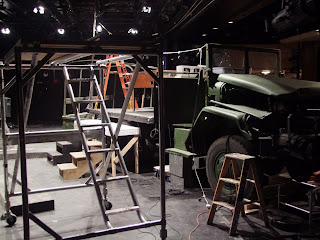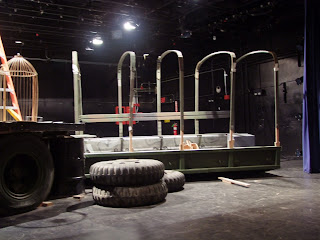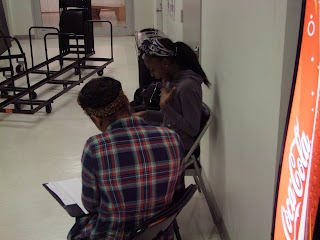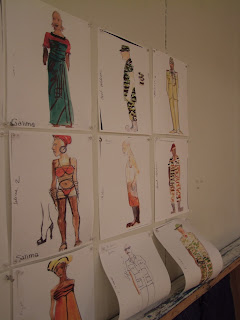Mayaa Boateng, a celebrated performer in Fordham University's Theatre Department, is perhaps one of the few graduating
seniors looking towards her future and career saying: “I feel like I am
ready.” At a Saturday morning interview right before tech rehearsals for her last show on the Fordham Mainstage, Mayaa displays a relaxed focus; the ideal state for someone preparing for great success with many roles and interviews to come.
Mayaa did not start off acting in the most traditional route. The daughter of Ghanian immigrants who settled in a struggling urban section of Maryland, it wasn't always easy to find creative outlets in her surroundings. One of her very first performing exploits occurred at the tender age of nine, when she began practicing pantomime. “I would paint my face and do sign language and learn these gestures to music,” says Ms. Boateng. "Movement was the first way I learned to tell stories".
In her adolescence, Mayaa was a graduate of the prestigious Duke Ellington School for the Arts in Washington D.C, near where she grew up in Maryland. She credits this period of her life with introducing her to “the rigor and the value of acting.” She gained an array of theatre-related valuable experiences in high-school. Laughing, she recalls her part in The Wiz, where she did not play and average part, she confesses—“I was the stunt woman of the show…I was actually flying across the stage.” And as if flying wasn’t enough, she also learned “to walk on stilts and crack a whip,” which, “I still have on my resume” she said.
In her adolescence, Mayaa was a graduate of the prestigious Duke Ellington School for the Arts in Washington D.C, near where she grew up in Maryland. She credits this period of her life with introducing her to “the rigor and the value of acting.” She gained an array of theatre-related valuable experiences in high-school. Laughing, she recalls her part in The Wiz, where she did not play and average part, she confesses—“I was the stunt woman of the show…I was actually flying across the stage.” And as if flying wasn’t enough, she also learned “to walk on stilts and crack a whip,” which, “I still have on my resume” she said.

All of her life through the end of high school, she tried to maintain a wide range of interests in and out of theatre. She recognizes that is part of what drew her to Fordham's Theatre program, which gives a Bachelor of Arts including academic work. She says, “I am grateful about Fordham’s curriculum. I knew that I had so many talents, and so many passions, and so many things I wanted to explore to inform my acting.”
Mayaa strongly feels that acting is not something apart from the rest of the academics. As an example of this, Spanish has always been one her favorite and also most practical school subjects. “It’s humbling to learn another language”, she says. Her Spanish skills came in handy when she played a Mexican character in Lydia in 2012 and in real life, too, when she traveled to Colombia. While there, she and her friend found themselves at a local high school where her friend’s dad was a professor. “We went there and spoke to the children and we were teaching them English! It was amazing” she recalls with enthusiasm.
In another international experience, in 2007 Mayaa traveled to Senegal with the “Art Creates Life” humanitarian association. “It was probably one of the best learning experiences I ever had. We were raising AIDS awareness” she explained. Mayaa has always found other ways to use her talent for more than just her own enjoyment. It is essential to her that her work serves a greater purpose in educating and affecting people. “I find that I always tell myself that I don’t want ‘just’ to be acting in life. If I’m not using my skills as an actor to do something for the world, to do something greater, than why am I doing it for?”
Since she has come to Fordham, she has donated her considerable talents all over the place. She was cast in at least one play every semester of her college career, usually in lead characters requiring emotional depth and character research. Her performance in "The Wedding Band" in 2010 brought audiences to tears and to their feet.
To her surprise, in the summer between her junior and senior years she found out she was the first ever recipient of the Denzel Washington Theatre Scholarship, a major honor that led her to be featured in several publications from the school newspaper to Theatre Department promotional materials.
Her final Fordham show and most recent production, Ruined, by Pulitzer Prize-winning playwright Lynn Nottage, reveals the struggles that Congolese women endured during the brutal civil war of the nineties and early 2000’s. Many women found themselves being violently abused by national and rebel soldiers. The characters of Ruined were forced to decide, as many women in the Democratic Republic of Congo were, that life would be safer for them if living in a brothel. The play deals with issues of rape, prostitution, genital mutilation, and sisterhood, which is seen in the play as one of the only ways to survive.
 Boateng describes this production as “the hardest show I’ve ever worked on…It’s been a
roller-coaster.” Mayaa plays the role of Salima, the one character that sees the
most tragic end through the course of the play. From the very first rehearsal
Mayaa knew it would have been a tough role. Her emotions were tapped in an
unexpected way at the first read through, where she had a break down while
rehearsing. “Being able to find yourself in the character and distance yourself
from the trauma at the same time is so hard,” explains Ms. Boateng. But her
advice when deeply challenged by a show is “trust your director.” "Working with
the director of this Fordham production of “Ruined”, Isis Misdary, has been
such a growing experience for me” Mayaa said. “She kept on repeating to us ‘Pursue
your objective
with passion! She has been amazing.” In regards to Misdary’s encouraging
spirit, Ms. Boateng stated “I feel like I as an actor, I really ‘pursued the
objective with passion’. That just speaks to what I learned as an actor, not to
only pursue my objective with passion, but what I want in life as Mayaa.”
Boateng describes this production as “the hardest show I’ve ever worked on…It’s been a
roller-coaster.” Mayaa plays the role of Salima, the one character that sees the
most tragic end through the course of the play. From the very first rehearsal
Mayaa knew it would have been a tough role. Her emotions were tapped in an
unexpected way at the first read through, where she had a break down while
rehearsing. “Being able to find yourself in the character and distance yourself
from the trauma at the same time is so hard,” explains Ms. Boateng. But her
advice when deeply challenged by a show is “trust your director.” "Working with
the director of this Fordham production of “Ruined”, Isis Misdary, has been
such a growing experience for me” Mayaa said. “She kept on repeating to us ‘Pursue
your objective
with passion! She has been amazing.” In regards to Misdary’s encouraging
spirit, Ms. Boateng stated “I feel like I as an actor, I really ‘pursued the
objective with passion’. That just speaks to what I learned as an actor, not to
only pursue my objective with passion, but what I want in life as Mayaa.”
Regarding
awakening the world about the violence of women she comments: “I feel really
strong about the mission of this play. I want to continue to bring important
stories to life, which is my real task through acting” she stated. “These
women, their bodies have been used as the battle ground…they all have such a
desire to be heard, to have their stories heard. And I feel like there’s power
in that both for the characters and for the real Congolese women and for
myself, for them to be heard” Ms. Boateng says.
Mayaa is ready to “pursue her
objective with passion” she repeats while smiling firmly. Ms. Boateng’s intends to stay in New York and audition until her next opportunity makes its way. In addition to preparing to take on the big city, she has been working as an audition monitor for Actor’s Equity Association for the last several months . Looking
to her future, Mayaa is open to new acting opportunities in film and television bu she knows, “my heart is in the theatre.”













































